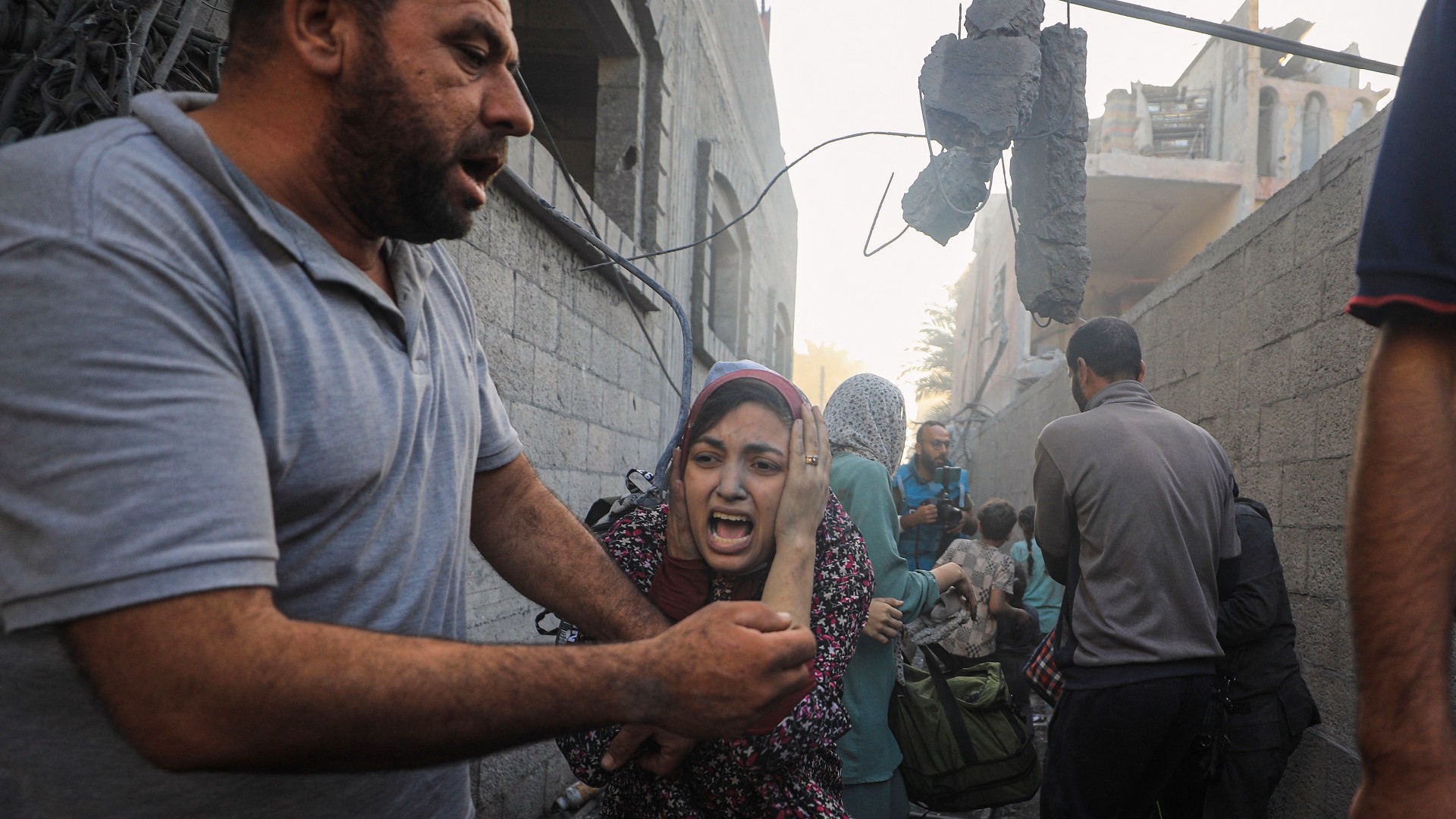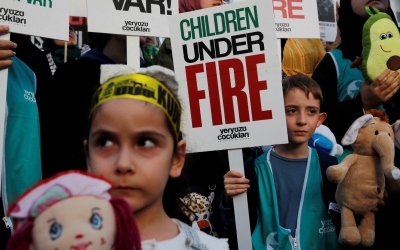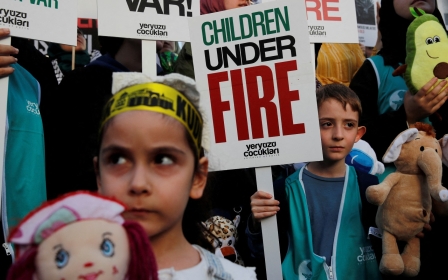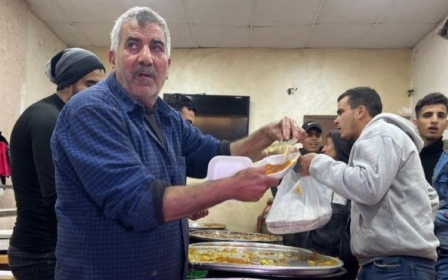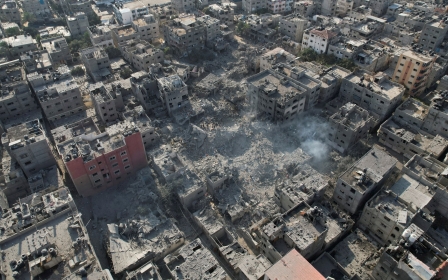Israel-Palestine war: Gaza death toll passes 10,000 as aid groups plead for ceasefire
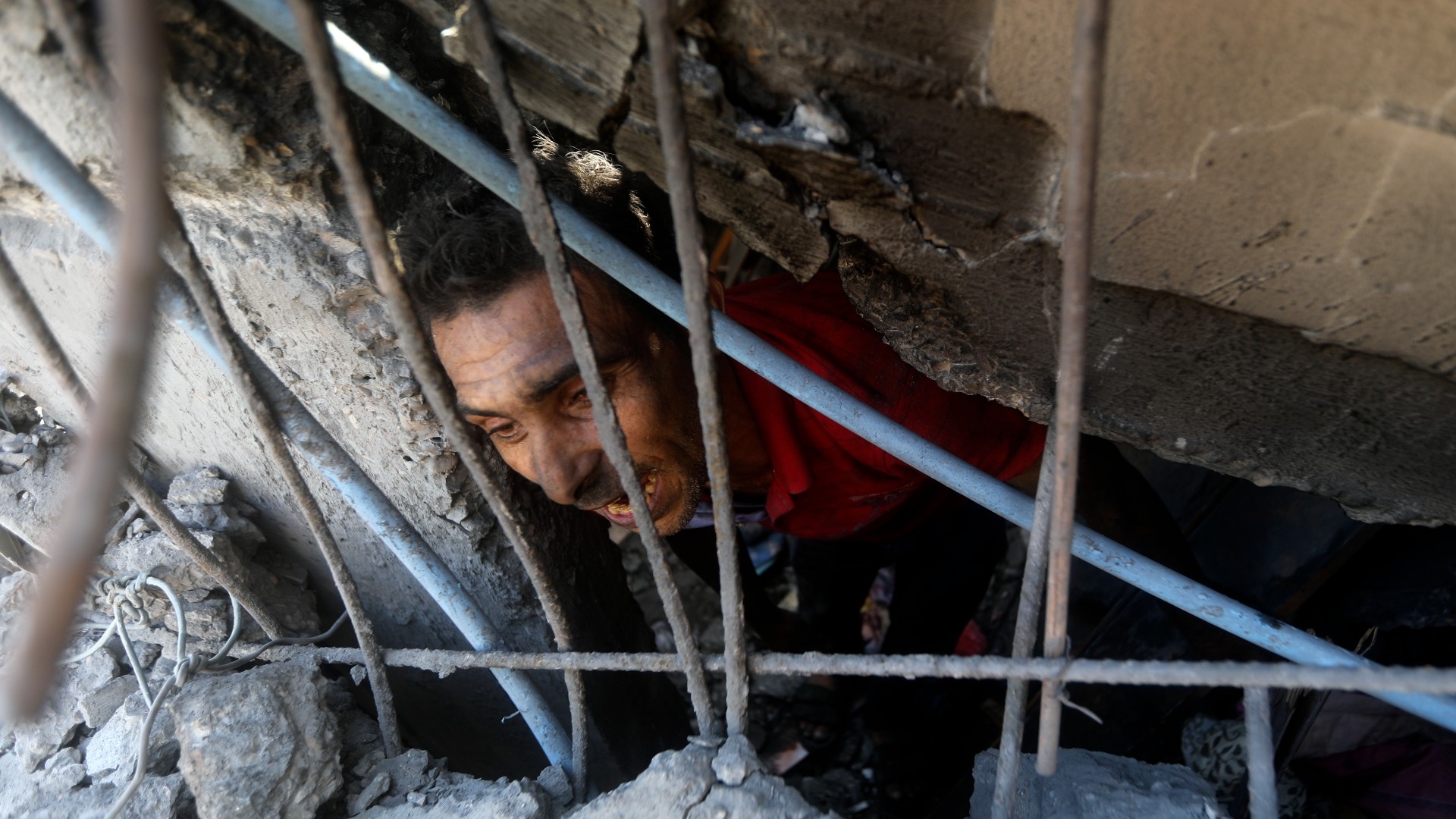
At least 10,000 Palestinians have now been killed in Gaza after four weeks of Israeli bombardment, with UN agencies and NGOs pleading on Monday for a ceasefire in the besieged enclave.
The heads of 18 UN agencies and NGOs issued a joint statement calling for an end to the violence in Gaza, where more than 4,100 children have been killed by Israeli bombing.
The signatories, including the heads of Unicef, the World Food Programme, the World Health Organisation and Save the Children, warned that the entire population of Gaza was being "denied access to the essentials for survival, bombed in their homes, shelters, hospitals and places of worship".
"We need an immediate humanitarian ceasefire. It's been 30 days. Enough is enough. This must stop now," read the statement.
Their plea comes as ambulances carrying wounded Palestinians arrived in Egypt through the Rafah border crossing.
New MEE newsletter: Jerusalem Dispatch
Sign up to get the latest insights and analysis on Israel-Palestine, alongside Turkey Unpacked and other MEE newsletters
A border official told AFP the patients were undergoing medical examinations at the border before being transferred to hospitals. He added that the evacuation of people with foreign citizenship trapped in Gaza would also resume on Monday.
Monday's grim milestone of 10,000 deaths followed another night of heavy bombing in Gaza.
The Palestinian health ministry said that 70 percent of the death toll comprised women, children and the elderly. Around 2,500 women are believed to have been killed, as well as 500 elderly people. Nearly 25,000 more people have also been wounded.
The ministry said Israeli air strikes on several hospitals in Gaza City on Monday killed eight Palestinians.
Four were killed at the al-Rantisi paediatric hospital, while four others were killed at Gaza's eye hospital. The Israeli military also targeted the enclave's only psychiatric hospital.
All three hospitals are a short distance away from each other in Gaza City, which is currently encircled by Israeli ground troops.
West Bank unrest
Violence and unrest has also continued across the occupied West Bank, with attacks by Israeli settlers and Palestinian armed groups occurring with increasing frequency.
The UN has warned of an "alarming" escalation of settler violence against Palestinians, with at least 144 Palestinians killed in the West Bank by Israeli fire since 7 October.
On Monday, far-right Israeli Finance Minister Bezalel Smotrich called for the creation of “sterile security zones” around illegal Israeli settlements in the West Bank to “prevent Arabs from entering them”.
In a letter to Prime Minister Benjamin Netanyahu and Defence Minister Yoav Gallant, Smotrich, the de facto “governor” of the West Bank, demanded that Palestinians be barred from the areas encircling the settlements. There are nearly 150 illegal settlements across the West Bank, housing around 700,000 Israelis.
The move would presumably include lands Palestinians own, even to harvest olives, Israeli media reported.
In the letter, Smotrich denounced "the continued neglect of the security of the settlers in Judea and Samaria", using an Israeli name for the West Bank.
"The writing is on the wall and I am not ready to be a part of it. I will not agree to additional blood under my watch due to insistence on maintaining distorted perceptions,” he wrote.
In addition to widespread civilian deaths, media rights organisations have warned that the conflict has seen an "unprecedented" number of journalists killed.
The Committee to Protect Journalists (CPJ) has said the violence since 7 October - when Palestinian groups launched a surprise attack on southern Israeli communities, killing more than 1,300 people in Israel and taking around 240 captives - has been the deadliest four-week period for journalists covering conflict since they began documenting journalist fatalities in 1992.
'The [death] toll is heartbreaking and unfortunately it is paid by, and continues to be paid by, Palestinian journalists who face an outsized risk'
- Sherif Mansour, Committee to Protect Journalists
As of Monday, the organisation said 36 journalists and media workers had been confirmed dead, the vast majority Palestinian, as well as four Israelis and one Lebanese.
Three others were also reported missing, while many more had been arrested, injured or threatened.
Sherif Mansour, the CPJ's Middle East and North Africa Program Coordinator, told Middle East Eye that many of those killed were local freelancers without the protection provided by large media outlets or foreign passports.
He said that the Israeli army needed to make their rules of engagement more transparent, as many of the journalists in Gaza "may not have the option to avoid combat situations."
"Of course the toll is heartbreaking and unfortunately it is paid by, and continues to be paid by, Palestinian journalists who face an outsized risk," he explained.
"This is a sacrifice that should not be made easily."
Relations breakdown
The ongoing attacks on the Gaza Strip have continued to spark outcry and a number of countries have downgraded or broken off relations with Israel.
South Africa became the latest diplomatic casualty on Monday, announcing it would recall all its diplomats from Israel to "signal" its concern over the situation in Gaza.
"The South African government has decided to withdraw all its diplomats in Tel Aviv for consultation," Khumbudzo Ntshavheni, a minister in the president's office, told a press briefing.
A number of Israel's erstwhile regional allies, including Jordan and Turkey, have recalled their ambassadors to the country.
Further afield, Colombia and Chile have downgraded relations, while Bolivia broke them off altogether.
The fighting has proved a major headache for the US which had, prior to 7 October, been pushing to advance the establishment of open relations between Arab countries and Israel, a process that began under President Donald Trump.
While the UAE, Bahrain, Morocco and Sudan all established relations with Israel in 2020, widespread anger in the populations of those countries over Gaza has seen some leaders publicly playing down their ties.
There is also decreasing hope of a breakthrough, much desired by the US, in relations between Israel and regional heavyweight Saudi Arabia.
Two people familiar with the issue told Middle East Eye that Saudi Arabia was set to host a summit of regional countries on Sunday, aiming to unify pro-Palestinian states that are asking for a ceasefire.
A person familiar with the Saudi plans to host a summit said that Islamic countries were divided, with some, such as Jordan, finding it hard to stand up to the US and Israel due to their over-dependence on western support.
“Egypt’s Cairo Peace Summit last month was a good initiative to underline the importance of a ceasefire, but western states that attended the conference blocked every move to meaningfully oppose the Israeli attacks against the civilians,” the person added.
Middle East Eye delivers independent and unrivalled coverage and analysis of the Middle East, North Africa and beyond. To learn more about republishing this content and the associated fees, please fill out this form. More about MEE can be found here.


